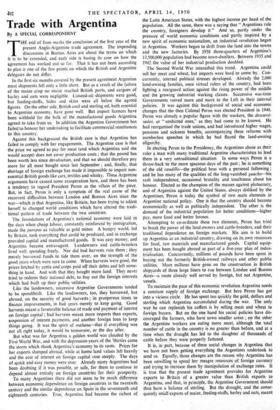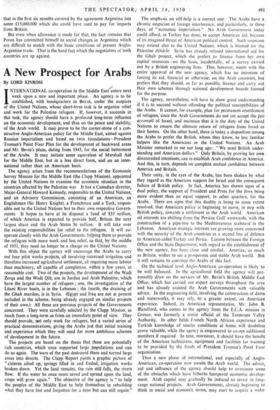Trade with Argentina
By A SPECIAL CORRESPONDENT THE end of June marks the conclusion of the first year of the present Anglo-Argentine trade agreement. The impending discussions in Buenos Aires are about the terms on which it is to be extended, and each side is basing its case on how the agreement has worked out so far. That it has not .been according to plan is one of the few points on which the British and Argentine delegates do not differ.
In the first six months covered by the present agreement Argentine meat shipments fell only a little short. But as a result of the failure of the maize crop no maize reached British ports, and cargoes of barley and oats were negligible. Linseed-oil shipments were good, but feeding-stuffs, hides and skins were all below the agreed figures. On the other side, British coal and sterling oil, both essential to Argentine economy, have gone well. But import licences have been withheld for the bulk of the manufactured goods Argentina agreed to take from us. In addition the Argentine Government has failed to honour her undertaking to facilitate commercial remittances to this country.
Against this background the British case is that Argentina has failed to comply with her engagements. The Argentine case is that the price we agreed to pay for meat (and which Argentina said she would accept) does not cover production costs ; that the pound has been worth less since devaluation, and that we should therefore pay more for all meat bought since last September ; and, finally, that shortage of foreign exchange has made it impossible to import non- essential British goods like cars, textiles and whisky. These Argentine arguments have caused some exasperation here, and there has been a tendency to regard President Peron as the villain of the piece. But, in fact, Peron is only a symptom of the real cause of the recurrent difficulties between London and Buenos Aires since the war—which is that Argentina, like Britain, has been trying to adjust herself to changed world conditions which have altered the tradi- tional pattern of trade between the two countries.
The foundations of Argentina's national economy were laid in the days when cheap labour, constantly reinforced by immigration, made the pampas as valuable as gold mines. A hungry world, led by Britain, took everything that could be produced, and in exchange provided capital and manufactured goods. It was easy money, and Argentina became extravagant. Landowners and cattle-breeders lived well, spending freely. Nor did bad harvests ruin them ; they merely borrowed funds to tide them over, on the strength of the good years which were sure to come. When harvests were good, the prices fetched by cattle and crops paid off their debts and left some- thing in hand. And with that they bought more land. They never tried to redeem their national debt, to buy out the foreign interests which had built up their public utilities.
Like the landowners, successive Argentine Governments tended to be spendthrift. Like the landowners, too, they borrowed, but abroad, on the security of good harvests ; in prosperous times to finance improvements, in bad years merely to keep going. Good harvests meant a favourable balance of trade and payment of interest on foreign capital ; bad harvests meant more imports than exports, suspension of interest payments, and another foreign loan to keep things going. It was the spirit of macula—that if everything was not all, right today, it would be tomorrow, or the day after.
But what was for Argentina a golden world was clouded by the First World War, and with the depression-years of the 'thirties came the storm which shook Argentina's economy to its roots. Prices for her exports slumped abroad, while at home_ land values fell heavily and the cost of interest on foreign capital rose steeply. The days of quick and easy money were over. Already many Argentines had been doubting if it was possible, or safe, for them to continue to depend almost entirely on foreign countries for their prosperity.
To many Argentines there did not seem to be much difference between economic dependence on foreign countries in the twentieth century and the similar dependence on Spain in the seventeenth and eighteenth centuries. True, Argentina had become the richest of the Latin American States, with the highest income per head of the population. All the same, there was a saying that " Argentines rule the country, foreigners develop it." And so, partly under the pressure of world economic conditions and partly inspired by a new spirit of economic nationalism, an industrial revolution began in Argentina. Workers began to drift from the land into the towns and the new factories. By 1938 three-quarters of Argentina's 13,500,000 population had become town-dwellers. Between 1935 and 1942 the value of her industrial production doubled.
The Second World War intensified this trend. Argentina could sell her meat and wheat, but imports were hard to come by. Con- currently, internal political stresses developed. Already the 2,000 land-owning families, once virtual rulers of the country, had been fighting a rearguard action against the rising power of the middle and the growing industrial Working classes. Successive war-time Governments veered more and more to the Left in their internal policies. It was against this background of social and economic changes that the then Colonel Peron was elected President in 1946.
Peron was already a popular figure with the workers, the descami- sados, or " unshirted ones," as they had come to be known. He had reorganised the trade unions, and had introduced higher wages, pensions and sickness benefits, accompanying these reforms with numberless speeches in which he had flayed the land-owning oligarchy.
In electing Peron to the Presidency, the Argentines chose as their ruler a man with many traditional Argentine characteristics to lead them in a very untraditional situation. In some ways Peron is a throw-back to the more spacious days of the past ; he is something of the old caudillo—the political boss with a personal following ; and he has many of the qualities of the long-vanished guacho—his rash independence, occasional brutality and touchiness about his honour. Elected as the champion of the masses against plutocracy, and of Argentina against the United States, always disliked by the Argentines, Peron is today the symbol of two main elements in Argentine national policy. One is that the country should become economically as well as politically independent. The other is the demand of the industrial population for better conditions—higher pay, more food and better houses.
Attempting to co-ordinate these two elements, Peron has tried to break the power of the land-owners and cattle-breeders, and their traditional dependence on foreign markets. His aim is to build up Argentina as an industrial country, drawing on its own resources for food, raw materials and manufactured goods. Capital equip- ment has been bought abroad as part of a five-year plan of indus- trialisation. Concurrently, millions of pounds have been spent in buying out the formerly British-owned railways and other public utilities. More millions have gone on the construction in British shipyards of three large liners to run between London and Buenos Aires—a route already well served by foreign, but not Argentine, vessels.
To maintain the pace of this economic revolution Argentina needs a constant supply of foreign exchange. But here Peron has got into a vicious circle. He has spent too quickly the gold, dollars and sterling which Argentina accumulated during the war. The only way he can replenish his coffers is by selling meat and wheat to foreign buyers. But on the one hand his social policies have dis- couraged the farmers, who have sown smaller areas ; on the other the Argentine workers are eating more meat, although the total number of cattle in the country is no greater than before, and at a time when the drought has led to the slaughter of thousands of cattle before they were properly fattened.
It is, in part, because of these social changes in Argentina that we have not been getting everything the Argentines undertook to send us. Equally, those changes are the reason why Argentina has been unwilling to spend her meagre resources of foreign currency and trying to increase them by manipulation of exchange rates. It is true that the present trade agreement provides for Argentine exports to Britain of a greater value than British exports to Argentina, and that, in principle, the Argentine Government should thus have a balance of sterling. But the drought, and the conse- quently small exports of maize, feeding-stuffs, barley and oats, meant that in the first six months covered by the agreement Argentina lost some £15,000,000 which she could have used to pay for imports from Britain.
But even when allowance is made for that, the fact remains that Peron has committed himself to social changes in Argentina which are difficult to match with the basic conditions of present Anglo- Argentine trade. That is the hard fact which the negotiators of both countries are up against.







































 Previous page
Previous page